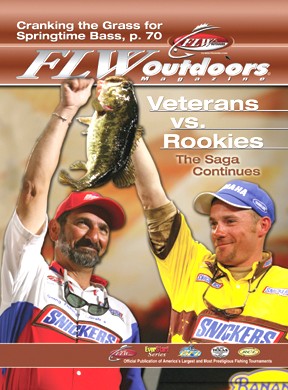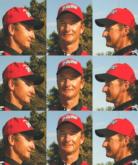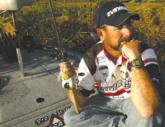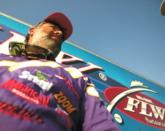Veteran’s day

These experienced anglers are giving the young guns a run for their money
The freshmen and the seniors, the young guns and the veterans, the rookies and the icons. Whatever you call it, it’s a classic theme in sporting events, especially in individual sports like auto racing, golf and fishing.
In NASCAR, rookie drivers are often pole winners and lead-lap sensations, but as the race wears on with wrecks, cautions and pit stops, the track seems to “come to” the racing veterans.
Golf tournaments are more dramatic when an amateur from Nowheresville, USA, dominates the opening round, only to shunt 10-foot putts in the finals under the pressure of pursuing pros.
This classic divide between green and seasoned in competitive bass fishing is especially conspicuous. In the early rounds of competition, young, brash tournament rookies toting hefty bags of bragging-sized bass to the scales are hard to overlook.
On day four, however, it is usually an angler with a little gray protruding from his cap that wraps his sun-wrinkled hands and callused fingers around the trophy.
Since the inception of the Wal-Mart FLW Tour in 1996 through the 2002 season, there have been 49 tournaments. Amazingly, one third of those tournaments have been won by just six anglers. More specifically, six anglers on the FLW Tour have won multiple titles; those six anglers have claimed 17 of 49 events.
David Fritts of Lexington, N.C., leads the way with four FLW Tour wins. Steve Daniel of Clewiston, Fla.; Clark Wendlandt of Cedar Park, Texas; and Rick Clunn of Ava, Mo., have each won three titles. Larry Nixon of Bee Branch, Ark., and Gary Klein of Weatherford, Texas, each have a pair of victories.
These six bass-fishing names have something undeniable in common: They are bass-fishing veterans. Five of these anglers were bass-fishing legends before the FLW Tour started. Wendlandt is the youngest of the multiple title holders, and he has been fishing national-level events since the mid-’80s.
Even beyond the multiple winners, veteran anglers nabbing FLW Tour titles include George Cochran, Randall Hutson, Darrel Robertson, Peter Thliveros, Mickey Bruce, Dion Hibdon and Tommy Biffle – more than half of the FLW Tour events have been taken by a select few angling veterans.
What makes them so good? Experience. The experience of a veteran angler is like the compounding dividend of a blue chip stock – the longer it’s in the market, the better the return.
 Gary Klein: Impending patterns
Gary Klein: Impending patterns
With a 25-year professional career to draw upon, Klein knows what experience brings to the table for veteran anglers.
“There are no substitutes for time on the water in professional bass fishing,” Klein said. “An angler may luck into winning a single tournament, but no angler is going to luck into being a bass pro. That takes experience.”
Tournament fishing is similar to auto racing. Just as track conditions either “come to” or “go away from” a driver during a race, changing lake conditions either “come to” or “go away from” an angler during a tournament.
“A weakness of younger anglers is to get on patterns that are peaking during practice and dissipating during the event,” Klein said. “Veterans are able to observe changing conditions and recognize what patterns are weakening and what patterns are developing.”
Klein won both Wal-Mart FLW Tour events held on the Mississippi River. While both wins required adaptation, his second win in 2000 was an example of how veteran pros change with conditions and recognize impending patterns.
On the first day of the tournament, Klein caught five bass weighing 19 pounds on a pattern that was prevalent in practice but was “going away” because of intense fishing pressure and rapidly falling water.
Klein’s day-two catch of three bass weighing 11 pounds, 12 ounces was a reflection of the dissipating pattern. On day three, Klein discovered where bass were moving with the falling water levels. He recognized a developing pattern that he knew would only get stronger with falling water. Suddenly his nemesis, the falling water, became his boon. His weight rebounded on day three with five bass weighing 17 pounds, 2 ounces.
On day four, the developing pattern played right into Klein’s hands, and he weighed in the biggest stringer of the event, five bass weighing 21 pounds, 15 ounces, to claim victory.
“That is the kind of thing nobody can teach you,” he said. “You only learn about changing conditions and impending patterns from personal experience on the water.”
Thliveros, a tournament-fishing veteran from Jacksonville, Fla., sees timing as an abstract principle in bass fishing that can only be learned from experience, not from phone calls or dock talk.
“On the water, timing is about being at the right place at the right time,” Thliveros said. “But timing is also about not being at the wrong place at the wrong time. That’s when experience becomes a big player. Things change hourly on the water – wind, clouds, tides, major and minor feeds – any number of these things cause activity levels of bass to increase and decrease throughout the day. Good timing is when your fishing efforts are in sync with those changing activity levels all day. It’s something you develop a feel for.”
Thliveros says timing is applicable to veterans in a broader sense as well. After 20 years of tournament fishing, an angler has experienced plenty of peaks and valleys in performance. As a result, veterans are able to realize when they are on a roll and when they are in a lull.
“It’s momentum,” Thliveros said. “In the beginning of my career, I just went fishing. If I won, great; if not, oh well. Only after several extended peaks and valleys in performance did I begin to get a sixth sense for when I was fishing well and when I was not. Now I have a much better feel for where I stand in my performance cycle at any given time. That makes a tremendous difference in on-the-water decision making and timing.”
Thliveros points to June of 1999 as a time when his overall momentum was the catalyst for perfect on-the-water timing.
“The last event of the year was the Forrest Wood Open on Lake St. Clair,” he said. “I knew I was going to do well because I could feel my momentum building. My finishes on both tours had been getting better all spring. When I got to St. Clair, my sense of timing each day on the water was perfect – right down to catching the tournament-winning fish on my very last cast of the event.”
Larry Nixon: Avoiding panic
Nixon cites panic as well as an inability to adapt to changing conditions as the two most common pitfalls of less experienced anglers. The famed fishing general knows the two obstacles well. He has encountered them a few times in his 30-year guiding and tournament career.
To avoid the stumbling blocks, Nixon has learned to stay flexible in his game plan and not to press the “panic button.”
 “The biggest thing that experience gives a fisherman is knowing when to fold your cards and do something different,” Nixon said. “Experienced anglers adjust quicker instead of forcing a dying pattern or hitting the panic button.”
“The biggest thing that experience gives a fisherman is knowing when to fold your cards and do something different,” Nixon said. “Experienced anglers adjust quicker instead of forcing a dying pattern or hitting the panic button.”
A prime example of Nixon’s mastery of adjustment was demonstrated in February of 2002, when he did a final-day 180 at the Wheeler Lake FLW Tour event to adapt to changing conditions.
Nixon’s primary pattern on Wheeler’s Decatur Flats began to fizzle on day three when he caught just three bass weighing 5 pounds, 15 ounces. The small weight did two things: barely qualify him for the finals and tip him off to the changing conditions. Rising water, falling temperatures and chilling winds had started to curtail his flats patterns.
Nixon knew his flats pattern was “going away.” By going back to Decatur Flats on the final day, he knew he would die with his pattern. He needed to adjust.
On the final morning, Nixon made a last-minute decision to throw his flats plan out the window and fish a different part of the lake with a completely different pattern.
Nixon crushed those anglers who continued to fish the patterns that had delivered them to the finals. His five-bass stringer weighing 16 pounds, 9 ounces was 7 pounds more than he needed to beat his competition.
“Tournament competition in bass fishing is reacting to what Mother Nature throws at you every day,” Nixon said. “In a four-day tournament, she’s going to throw some curveballs. But you can’t panic, and you can’t force what was working three days ago. You have to make proper adjustments. Those adjustments require experience.”
Steve Daniel: The little things
For this Kellogg’s pro, bass fishing is a way of life. He is not only a veteran tournament angler but also a longtime fishing guide on Lake Okeechobee.
Daniel describes fishing experience as an ineffable reference to draw from, similar to intuition. According to Daniel, that experience plays the biggest role when the fish are not biting. He says tough conditions separate the veteran anglers from the rest of the field.
“When the fish are biting here on Okeechobee, nearly anyone can catch them,” he said. “But when a big front shuts them down and it gets tough, that’s when the veterans lick their chops, because then it takes experience to catch fish.”
 Daniel points out that the little things separate veteran anglers from less experienced anglers.
Daniel points out that the little things separate veteran anglers from less experienced anglers.
“The amount of information a guy like Clunn or Nixon can tell you after catching a single bass is incredible,” Daniel said. “How the fish hit the bait, how the fish is hooked, where the fish came from, what the bait was doing when the strike came, the size, even the color of the fish – all of these things give clues about what is happening underwater.”
Additionally, Daniel says veterans are always looking for better, more efficient ways to catch bass.
“If a less experienced angler catches a bass on a lipless crankbait, he will probably keep throwing a lipless crankbait,” he said. “If an experienced tournament angler catches a bass on a lipless crankbait, his next question will be: Will they hit a spinner bait? The chances of losing a fish on a spinner bait are less than on a lipless crankbait. Getting the bite is important, but getting them in the boat is just as important.”
Finally, Daniel says that sometimes less experienced anglers look for too much information. He should know – the Okeechobee guide is constantly being shaken down for lake information.
He reports that experienced anglers just want the basics: how much weight it is taking to win tournaments, water temperatures, water clarity.
“But these young guys want to know where the last five tournaments were won, what baits won the tournaments, what color the spinner bait trailer was – the questions never end,” he said. “They’ve got a hundred ideas swimming around in their head before they even start practice. What they have to realize is that no amount of information is a substitute for experience.”
Click on the links to see related stories: “A tale of two seasons” and “Dollar sign of the times.”
